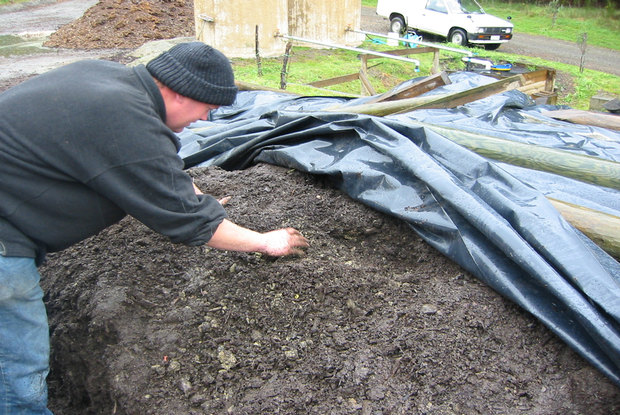Over the next month we are going to write a series of posts about how to increase organic matter and biology in pastoral systems. This is a very important topic and one that can have huge implications on a farming system. The posts are going to focus on the following topics:
- Diverse Pastures
- Topping
- Sabbatical Fallows
- Compost
- Targeted Biological Inputs
4. Compost
Compost is rich in nutrients, and it promotes soil microbes that aid plant growth. In a nutshell, compost is decomposed organic matter. Composting is a natural process of recycling organic material into a rich soil amendment.
The Many Benefits of Compost
Compost energizes the soil food web, which is made up of microscopic bacteria and fungi, along with earthworms, crickets, and many other life forms. Many fungi form symbiotic, or mutually rewarding, partnerships with plant roots, making it possible for plants/crops to feed themselves more efficiently. Research shows that compost enhances the ability to stand up to common diseases. Compost also helps the soil retain moisture.
What Is the Difference Between Compost and Fertiliser?
The simplest way to distinguish between compost and fertiliser is to remember this: Compost feeds the soil and fertiliser feeds the plants.
Fertiliser adds to the soil’s nutrient supply, but instead of feeding the soil food web, the ingredients in fertilisers are intended to meet the needs of fast-growing plants. While recommended amounts of compost can be quite general, fertiliser application rates are based on the needs of plants. Either organic or conventional fertilisers work well, but organic fertilisers have been shown to be friendlier to the soil food web. Chemical fertiliser can also feed composting, but continual use may throw soil chemistry out of balance and discourage microbes.
Compost and organic fertilisers can work together. The organic matter in compost sponges up the fertiliser nutrients until they are needed by plants. Compost also provides many nutrients that plants need in small amounts, such as boron. You can use fertiliser without compost, but why miss an opportunity to increase your soil’s fertility and its ability to hold moisture? Soil that is regularly amended (i.e., improved) with compost becomes wonderfully dark and crumbly and often requires much less fertiliser compared to soil that has not yet benefited from regular helpings of compost.
Composting with EM
Composting using EM is a safe and simple way of improving the effectiveness and output of your composting system. EM can be used in both aerobic and anaerobic composting systems and has many advantages over traditional composting. These include:
- High microbial content
- Increased composting speed
- High Energy (anaerobic method only)
- High Nutrient levels
- Fermentation rather than decomposition (anaerobic method only)
- No leaching
Learn more about making compost with EM
Source link












